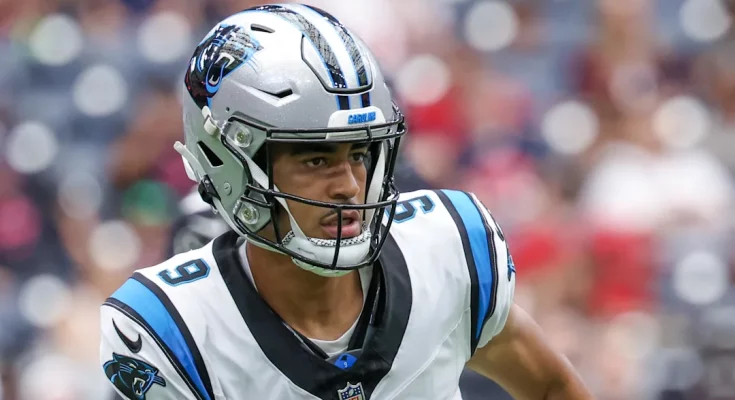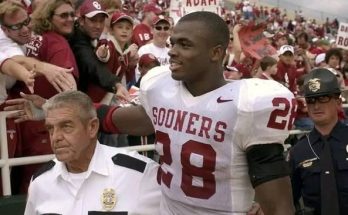Bryce Young’s journey with the Carolina Panthers has been one of intrigue, expectation, and enormous responsibility since the franchise made him the face of their future. When the Panthers invested the No. 1 overall pick in the 2023 NFL Draft to select the Heisman-winning quarterback out of Alabama, it was more than just a roster move. It was a declaration, a statement to the fanbase and the league that Carolina was ready to reset and rebuild its identity around a new signal-caller. With that kind of investment comes the kind of pressure very few athletes in professional sports can escape, and as ESPN recently highlighted, Young has become the Panthers’ player under the most scrutiny heading into this critical stage of his young career. The pressure on him doesn’t just stem from draft status—it comes from organizational expectations, fan impatience, and the weight of leading a franchise desperate to return to relevance in a crowded NFL landscape.
From the moment his name was called on draft night, Bryce Young was tasked with reviving a franchise that has struggled for consistency since the glory days of Cam Newton. The shadow of Newton’s MVP season and the team’s Super Bowl 50 run still lingers, leaving the fanbase hungry for another era of dominance. Unfortunately, the years since Newton’s departure have been defined by quarterback instability, coaching changes, and a revolving door of offensive philosophies. By choosing Young, the Panthers placed the hopes of reversing that cycle on his shoulders. Unlike veterans who may be given a grace period, first overall picks are expected to transform the culture immediately. For Young, the pressure lies not just in performing well statistically, but in restoring belief to a franchise that has long felt stuck in mediocrity.
ESPN’s analysis frames Young’s position not only as the most important player on the roster but also the one under the harshest spotlight. Quarterbacks naturally carry more responsibility than any other position in football, and when that quarterback is the centerpiece of a rebuild, the magnifying glass grows even larger. Every throw, every decision, every drive is dissected by analysts, fans, and critics alike. In Young’s case, his size and physical traits became points of concern even before he took an NFL snap. At just over 5-foot-10 and weighing around 200 pounds, many questioned whether his body could endure the rigors of professional football. When his rookie year was met with challenges—an inconsistent offensive line, limited weapons, and the natural adjustment curve of the NFL—the critiques only grew louder. That backdrop fuels the current narrative, with Young needing to prove not just that he belongs, but that he can thrive as the cornerstone of a franchise.
The Panthers’ organizational moves also highlight why the pressure sits so firmly on Young’s shoulders. Carolina didn’t just draft him—they traded significant assets to acquire the No. 1 overall pick. That blockbuster trade with the Chicago Bears, which sent DJ Moore and multiple high-value draft picks to Chicago, essentially tied the Panthers’ future to Young. Every success or failure he experiences carries amplified consequences because of what Carolina gave up to get him. When a team mortgages that much capital for one player, the pressure on that player multiplies. Young isn’t simply the quarterback of the present; he’s expected to justify the sacrifices made in his name. ESPN’s breakdown emphasizes that reality, making it clear that he represents not just a quarterback, but the symbol of the franchise’s new direction.
Another factor contributing to the intense scrutiny is the coaching situation. Frank Reich was hired to help mold Young, but his tenure ended prematurely, creating yet another coaching change for the young quarterback to navigate. With Dave Canales now taking over as head coach, the Panthers have doubled down on building a system tailored to Young’s strengths. Canales, known for his quarterback development work in Seattle and Tampa Bay, has been tasked with reigniting Young’s growth after a rocky start. This places even more emphasis on the quarterback himself. If Young fails to progress under a coach hired specifically to maximize his potential, the questions surrounding him will intensify further. ESPN’s coverage underscores how much Carolina has invested not just in drafting Young, but in restructuring the organization around his development. The message is clear: if he does not succeed, the entire project risks collapsing.
The fanbase also plays an undeniable role in why Young is under so much pressure. Carolina fans have endured years of frustration, from missed playoff appearances to uninspiring quarterback play. Each year that passes without progress adds to the urgency for a turnaround. When fans look at the roster, the offensive line still needs consistency, the receiving corps remains unproven, and the defense, while talented, cannot carry the team alone. All of that funnels back to the quarterback position. Rightly or wrongly, Young will be viewed as the difference-maker. If the Panthers succeed, he will be celebrated as the savior. If they falter, he will shoulder the brunt of the criticism. That kind of weight is what ESPN highlighted when calling him the player under the most pressure—it’s not just about performance, it’s about embodying the hopes and frustrations of an entire fanbase.
On a broader scale, the NFL’s quarterback-driven culture adds another layer of pressure. In today’s league, the margin for patience is shrinking. Teams like the Cincinnati Bengals, Kansas City Chiefs, and Los Angeles Chargers have seen their young quarterbacks blossom into stars quickly, raising expectations for other franchises to replicate that model. Fair or not, Bryce Young is measured against contemporaries like C.J. Stroud, who excelled immediately in Houston, and Anthony Richardson, who has shown flashes of star potential in Indianapolis. Stroud’s rookie success in particular has intensified the scrutiny on Young, as both were top-three picks in the same draft. While Stroud led the Texans to a playoff win in his first season, Young’s Panthers struggled to find consistency. That contrast fuels national narratives and adds more urgency for Young to prove he can keep pace with his peers.
The business side of the NFL cannot be ignored either. Ticket sales, merchandise, and local market excitement are all tied to quarterback play. The Panthers didn’t just draft Bryce Young to win games; they drafted him to sell hope and energize the Carolinas. That makes his success a business imperative as much as a football one. ESPN’s coverage highlights how integral Young’s performance is to the Panthers’ brand. If he delivers, the team gains momentum in the market. If he falters, enthusiasm wanes, and the pressure to find solutions grows heavier. Few players in the league are tasked with carrying both the on-field and off-field weight of a franchise as early in their careers as Young has been asked to do.
Adding to the narrative is Young’s personal demeanor and leadership style. Known for his calmness and poise, he has been praised for his maturity beyond his years. While that is a positive trait, it also creates unique challenges. Fans and media expect that demeanor to translate into results. When the wins don’t come, that calmness can be unfairly interpreted as passivity or lack of urgency. Thus, even Young’s personality becomes part of the pressure equation. ESPN’s analysis noted how much of the team’s identity is tied to his ability to lead, communicate, and inspire confidence. It’s not just about his arm talent—it’s about whether he can command a locker room and rally a team through adversity.
Despite all of these pressures, it’s important to note that Bryce Young has shown flashes of why the Panthers made him their cornerstone. His intelligence, accuracy, and decision-making, traits that made him a star at Alabama, are still evident. With improved support, particularly on the offensive line and at receiver, Young has the tools to grow into the quarterback Carolina envisioned. ESPN’s framing of him as the player under the most pressure isn’t necessarily a critique of his abilities—it’s an acknowledgment of the immense responsibilities and expectations that surround him. The narrative isn’t about whether he has talent; it’s about whether he can convert that talent into wins under the weight of heightened scrutiny.
As the Panthers move forward, the stakes for Young could not be higher. Every season without progress magnifies the spotlight, every loss deepens the narrative, and every misstep is magnified more than it would be for any other player on the roster. For Carolina, the success of their rebuild hinges almost entirely on whether Bryce Young can rise to the occasion. ESPN’s breakdown makes it clear: among all the players on the roster, no one carries as much on his shoulders as the young quarterback. The Panthers may have talented defenders, rising playmakers, and new coaches, but everything begins and ends with the man under center.
Ultimately, the story of Bryce Young’s career with the Panthers is still being written. The immense pressure he faces today is the byproduct of expectations that come with being the No. 1 overall pick and the face of a franchise desperate for stability. While the scrutiny is unavoidable, so too is the opportunity. If Young can weather the storm and grow into the leader Carolina believes he can be, he won’t just relieve the pressure—he will redefine it, transforming it into legacy. The next chapters of his journey will determine whether he becomes a cautionary tale or the cornerstone of a new era in Panthers football. For now, though, as ESPN aptly noted, there is no question that Bryce Young stands as the Carolina Panthers’ player under the most pressure, carrying both the burden and the promise of a franchise searching for its future.



